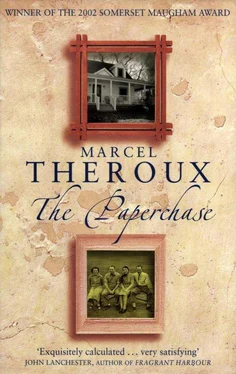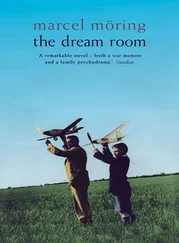We went back to the kitchen and Mr Diaz took his glass of water off the sideboard and drank it in one go, with his hand pressed against his stomach. He smacked his lips. The gesture signalled the end of his visit. ‘You’ve got your own well, haven’t you,’ he said, dabbing at his moustache with a handkerchief. ‘I always prefer the taste of well water.’
I opened the screen door for him. It slapped shut behind us. The sun had burned off the early morning haze and it was getting hot. We set off across the lawn towards Mr Diaz’s car, which was parked in the driveway, about a hundred yards away. He said I should make an appointment to come see him about the paperwork. ‘Get yourself settled in first, then give me a call,’ he said.
I stooped to pick up a handful of dead twigs from the lawn as we walked: they were like a speck of fluff on a huge baize billiard table. ‘There’s no phone,’ I said, ‘but I think I can call from my neighbours’.’
‘The Fernshaws?’
‘That’s right.’
‘Real Ionians,’ he said. ‘Not wetbacks like me.’ He smiled, his teeth ivory in the sunlight under his clipped moustache.
‘They’re deaf,’ I said.
‘Sure are. Used to be a lot of deaf people on the islands.’
‘I didn’t know that.’
‘Not so many of them now, but in the old days, I mean it’s a rural thing: small gene pool — lot of double yolkers.’
‘Inbreeding.’
‘That’s right. The islanders even evolved their own kind of sign language. My wife knows some actually. She’s a real islander.’
‘She’s not deaf though?’
‘Who?’
‘Your wife.’
‘Oh no. Everyone spoke sign language back then — everyone was related to someone who was deaf so it was the easiest thing for everybody.’
We reached Mr Diaz’s car. He shook my hand and got in, then rolled down the window. ‘I was sorry I couldn’t be at the funeral,’ he said. ‘My wife had to go into the hospital and I drove up to Boston to be with her.’
‘Nothing serious, I hope.’
‘It looks like she’s out of the woods now, but she’ll be taking it easy over the summer just to be sure. She was real sorry about Patrick, too. He wasn’t the most easygoing guy in the world, but he was a kind man.’
While not the whole truth, it was as accurate a eulogy as anything that had been said at the funeral.
‘His death came right out of the blue,’ he added.
‘Yeah, it was a shock to me, too,’ I said, but I thought it was probably better not to explain why.
PATRICK’S CAR WAS PARKED inside the shed. It didn’t look much like it had twenty-eight years before, but then neither did I. The bodywork was pitted with rust and a dent in the door on the passenger side had been mended with a piece of plywood. It wasn’t a car you would want to pick up a date in. And that was sad. Every summer, Patrick told us the same stories about the dating rituals of his teenage years. They were stories like Homeric myth with their own catchphrases and epithets, and they had undergone much embellishment over the years. They were peopled with bizarre characters: the Bubble brothers, Mrs Thornquist, one-eyed Captain Spadger, Tackaberry Mackadoo; and they covered the years of Patrick’s youth, as an altar boy, as a student, as a high-school basketball star, a lifeguard at Revere Beach. It was a life that I envisaged taking place in Technicolor; a life a hundred times more exciting than the life I led.
Mr Sandford — he of the gerbil’s-arse moustache — once told my father that the function of epics is to embody the cardinal virtues of their society and their historical moment. In the Aeneid, I gather it’s filial piety; in the lliad, it’s martial valour; in 1950s America as described by my Uncle Patrick, the most important qualities a young man could possess were the right car and a duck’s-arse hairstyle.
Patrick went into more detail about how he used Vitalis to sculpt his hair before a date than Homer did about the armour of the Trojan heroes. He really didn’t care whether it was of interest to us. He was in a state of what recovering alcoholics call euphoric recall: he wasn’t here, he was there, in the America of Eisenhower and Elvis and tailfinned cars, shaping and preening before the bathroom mirror; almost believing that his bald head was covered with lustrous black locks.
So, for Patrick to have allowed his car to fall into a state of such disrepair was a bit like Siegfried selling the ring of the Nibelungen for two dollars at a yard sale.
To make matters worse, whoever had returned it from the other side of the island hadn’t bothered to disconnect the battery or even remove the towel from the passenger seat, which, presumably, Patrick had taken down to the running track to dry himself after the run which killed him.
The space behind the two front seats was so small that it seemed improbable that Vivian and I had ever fitted inside it, but we had. The two of us had been squashed in there as we drove back to Westwich that first Christmas.
When we got back to London at the beginning of January we had begun to correspond with Patrick. The two of us wrote long letters on my father’s yellow legal pads, and Patrick sent us drawings and silly poems back. I copied out the story of David and Goliath from a book I got from the library and told Patrick I had written it.
The following summer my father rented the house near Provincetown that became an annual fixture for the next ten years. We saw more of Patrick and Lydia, but to my recollection my father and Patrick never spent a night under the same roof. It was as though there was a tacit understanding that there were limits to their renewed friendship. If we stayed on Ionia, it was at a guest house in Westwich; and when Patrick stayed on the Cape, it was usually at a place in Provincetown. The only exception was the summer when we painted Patrick’s house. Vivian and I camped on Patrick’s lawn. As self-conscious adolescents, we didn’t feel comfortable sharing a bed.
But given these limits, I remember those summers as the happiest of my life. When I think of the word ‘childhood’, the first, most pleasant associations that spring to mind are the gold summer light on the beach outside Patrick’s house; the smell of candy-floss at the Barnstable County Fair; the tingle of a mild sunburn; my father and uncle squabbling over the barbecue; the cold, cold water of the Atlantic Ocean. These were my real inheritance. A happy enough childhood is the capital that supports you during your adult life.
About two years after that first Christmas, Lydia left Patrick for another man. My father told us we should remember Patrick in our prayers because he wasn’t well. I suppose this was his way of saying Patrick had had a nervous breakdown. Lydia’s departure marked the beginning of the closeness between Patrick and my father that lasted until I was about sixteen. They were both in effect now widowers, and I think they must have found the symmetry reassuring.
The idea of Patrick’s being jilted by Lydia got mixed up in my mind with a book I was reading at the time. The memory of his big white doorknob was still very fresh, and I’ve never quite shaken off the idea that my uncle was in fact the Dong with a Luminous Nose, abandoned by his Jumbly Girl, and searching for her by night over the Gromboolian Plain.
*
The battery in the Triumph was almost completely dead, so I found a charger in the shed and set it going.
Patrick’s car had played another role in the history of my family. The need for spare parts from England — they were unobtainable on Ionia — had been a link between Patrick and my father. I don’t know if it prevented them from falling out sooner than they did, but we stopped shopping for wine gums and wiper blades just before my sixteenth birthday. And it’s from then that I date the break-up of my fissiparous family.
Читать дальше












